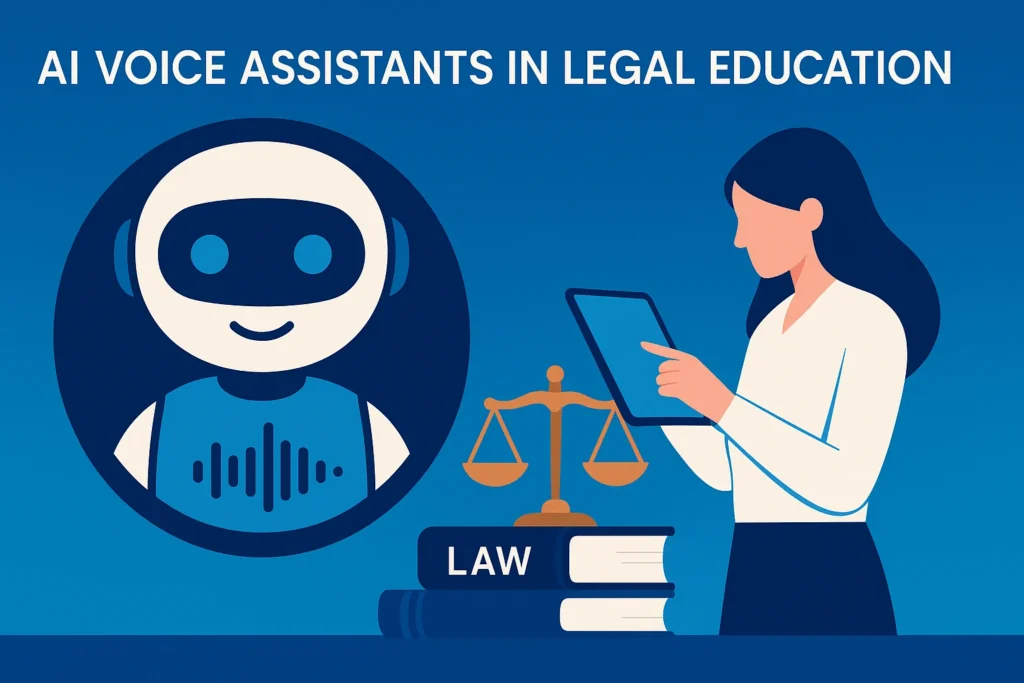Does Legal Education Still Look Like It Was from the 90s?
You are not alone.
Thousands of law students read through endless piles of PDF files, casebooks, and lectures in memorizing legal terms as if trying to win a mock trial. Professors are tremendously burdened. And what about law firms? All they want are graduates who are tech-savvy to run with it.
Here’s the problem: Traditional legal education is too slow for the speed of today’s legal world.
But there truly is something of the future entering classrooms and courtrooms alike: AI voice assistants. Kind of like Siri or Alexa, but trained for legal activity.
Let’s see how this technology is quietly changing the way law is learned and how it is delivered in the form of legal services.
Introduction: How AI Voice Assistants Are Reshaping Legal Education
Your finals are just around the corner. Your study desk is strewn with casebooks. You barely manage to keep your eyes open to make sense of an intricate tort law principle, and then a brilliant thought strikes you: what if there was someone to pose a question to who might provide a clear and concise answer?
Well, this can be done now.
The AI voice assistants are now breathing new life into legal education. They are fast-tracking the study processes of students, aiding their understanding, and simulating courtroom experiences-hands-free.
Such a shift in an otherwise formally entrenched field could be called paradigm-shifting.
Read Also: https://heyeve.ai/blogs/benefits-of-ai-in-legal-studies/
The Role of AI Voice Technology in Modern Legal Education
The advancement of NLP (natural language processing)-powered AI voice assistants has led these systems to penetrate educational study rooms on worldwide campuses. These tools provide students with digital study assistance, which enhances research quality rather than serving as teacher replacements.
They alter the existing system by implementing the following methods:
- Students who are listeners on the go can study law terminology with no hands required while exercising or traveling through neighborhoods. Meanwhile, students preparing meals benefit from this hands-free learning.
- An on-demand Q&A system enables users to receive immediate definitions for stare decisis by supplying actual cases as examples.
- The AI-generated tools in Mock Trial Practice duplicate courtroom speech to train law students for courtroom presentations and authentic trial stress.
Research conducted by LegalTech Lab in 2023 discovered that the academic performance of law students who used AI voice tools increased their retention by 30% above students who used traditional note-taking methods.
The use of AI technology transforms legal education rather than replacing it in any way.
AI Voice Assistants in Law Firms: Key Applications
The application of AI voice assistants extends beyond school classrooms because they produce meaningful impacts within the boundaries of law firms. These tools enable legal teams to save time by improving client service delivery from initial onboarding through research stages up to scheduling operations.
The most frequent uses of AI voice assistants exist in these specific areas:
Automated Legal Consultations
History shows that everybody sometimes needs to complete long legal intake forms. Voice assistants now make this type of laborious process a relic of the past.
The development of basic legal consultation capabilities through AI voice tools enables them to obtain responses from clients via questions such as:
Please explain your present trouble or specify the timeline when the incident happened.
The input information gets recorded during interviews and goes through transcription along with tag assignment to legal categories to speed up case evaluation for attorneys.
The study conducted by LegalTech AI in 2024 confirmed that law firms using voice-based client intake reduced their administrative workload by twelve hours a week.
Voice-Powered Case Analysis & Document Retrieval
The common practice among lawyers requires many hours dedicated to exploring files and case law documents.
Voice assistant technology allows them to provide commands through spoken statements.
The system needs to locate the court determination regarding intellectual property rights from 2022.
Users can access either the summary or the direct entry point to relevant information in less than a minute.
A mini research assistant function exists within certain tools to evaluate case context while suggesting matching precedents.
Client Follow-Ups & Scheduling Automation
The following repetitive legal work assignments can be managed by AI voice assistant technology:
- Scheduling meetings
- Sending reminders
- Following up after consultations
- Confirming court dates
Robotization of tasks creates better room for strategic initiatives rather than labor-intensive tasks.
According to the AI for Law Firms 2023 source documents, a law firm cut its client appointment no-shows by 40% after adopting voice scheduling software.
AI voice assistants have evolved into essential operational tools for contemporary law firms because they enable staff to accomplish purposeful work instead of replacing personnel.
Benefits of AI Voice Technology in Law Firms
Law firms that implement AI voice assistants earn more than mere technological flair because they obtain tangible, quantifiable outcomes.
Voice technology solutions are gaining popularity among law firms because of numerous benefits, which include:
Massive Time Saving
Since the process depends on human hand activity, it requires numerous hours to complete client intake and case file retrieval, and follow-ups.
With voice automation? Minutes.
Voice assistants implemented by LawTech Weekly survey participants generated up to a 38% reduction in administrative work within their initial three months of implementation.
Improved Accessibility
Voice-assisted technology enables clients with differing disabilities, including vision problems and handicaps, and language differences, to communicate more easily.
Voice assistants provide professionals the ability to perform different tasks simultaneously, including reading case notes on transportation routes and dictating summaries during transit periods.
24/7 Client Support
Voice bots don’t sleep.
They can answer straightforward legal questions and record client information twenty-four hours a day.
Law firms of all sizes benefit from this constant availability because it proves essential to attract new leads.
Consistent Communication
Human assistants typically fail to remind people, yet these voice assistants operate with very few errors.
The system delivers consistent, high-quality professional support for every scheduled communication and update process.
Challenges and Ethical Concerns
The flaws of speech-based Artificial Intelligence systems should be acknowledged without any doubt. These concerns require legal teams to focus on their response:
Data Privacy & Confidentiality
Legal information is extremely delicate. Voice transcripts become an enormous security risk when they lack encryption or when storage facilities do not meet security standards.
AI tools must satisfy the privacy requirements of GDPR and HIPAA when they process client datasets.
AI Bias and Misinterpretation
AI processing depends completely upon the quality of information used during its training phase.
This tool generates flawed interpretations or biased outputs when provided with low-standard legal training data. Human evaluation remains necessary for this reason.
Lack of Legal Judgment
AI voice assistants possess the capability to handle basic “what” questions but cannot match the judgmental and logical reasoning of licensed attorneys.
These devices serve as tools for assistance, while professional legal services always remain essential.
Voice systems function as robust firm resources when stakeholders establish adequate security protocols as well as training programs and supervision protocols.
Suggested Read: https://heyeve.ai/blogs/ai-in-legal-education/
The Future of AI Voice Technology in Law
Current changes within the legal sector are happening at an unprecedented speed.
Voice technology, which technicians would formerly classify as futuristic now operates regularly throughout legal education and practice. Here’s where things are headed:
AI-Integrated Law Classrooms
Educational institutions currently employ voice assistants for court simulation, student oral practice, and immediate student support. American Law schools will probably include AI voice tools among their fundamental requirements for future educational programs.
Multilingual AI for Global Law Firms
The process of globalization requires firms to provide services to customers who reside in different countries. AI voice assistants receive training in several languages alongside regional legal requirements for handling international translation, as well as complying with legal boundaries.
Judicial Training and Voice Simulation
AI voice tools are expected to enter judicial training programs to enable new judges in hearing simulations while providing them access to past decisions and training for real-time complex case decisions.
How Heyeve Supports AI Voice Tech in Legal Services
Heyeve dedicates its development resources toward creating voice-first artificial intelligence applications that serve the needs of legal professionals and educational institutions. Our solutions assist students in the following ways:
- Students need voice-controlled access to obtain case summaries and definitions
- The functionality of law firm operations improves through automatic intake processing and follow-up communication generation.
- Voice assistants should be incorporated into both CRM systems and knowledge bases within these networks.
- The organization must sustain absolute protection for data privacy and security requirements.
Examine how Heyeve is reforming legal services.
Conclusion: From Lecture Hall to Law Office—AI Voice is Here to Stay
AI voice assistants now provide students and lawyers with a modern type of assistance that delivers intelligent, instant assistance.
Your colleagues work alongside you to assist you in creating your best daily work outcome.
Voice technology has become mandatory in this profession, whose core values are time efficiency and accuracy, and message clarity.
FAQs
How are AI voice assistants used in legal education?
Studying students benefit from these digital assistants, which allow them to conduct legal inquiries and rehearse their presentation skills through virtual simulators.
Can AI voice technology handle client consultations?
AI voice tools can run basic consultations while retrieving case information and booking appointments, which allows legal staff to have additional time for their work.
Is AI voice tech reliable in law firms?
AI voice assistants working together with human supervision and appropriate security protocols ensure regular operation of effective legal system workflows.


